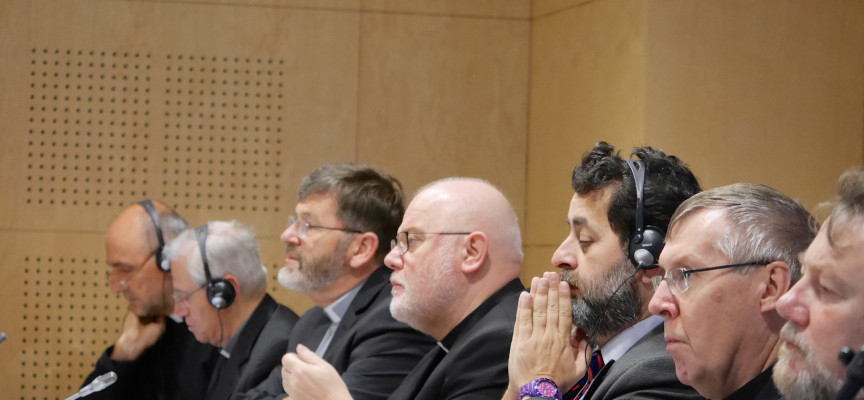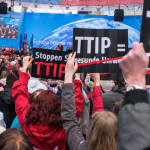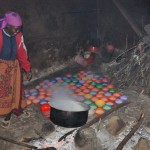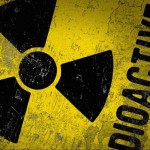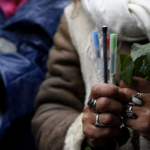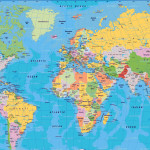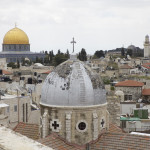A Free Trade Treaty is currently being negotiated between the United States and the European Union. The Transatlantic Trade and Investment Partnership (TTIP) remains controversial and raises a number of concerns. COMECE Bishops wished therefore to learn more about the economic and ethical aspects of the Treaty and explore it in greater detail on the occasion of their Autumn Plenary Assembly held on 12 and 13 November 2014 in Brussels.
The EU Chief Negotiator for the TTIP, Mr Garcia Bercero, informed COMECE Bishops at some length on the precise content of the negotiations and mentioned the elements that are not included (GMO, designation of origin), as well as the next steps in the negotiations. The French Economist, Pierre Defraigne, Executive Director of the Madariaga – College of Europe Foundation outlined his reservations concerning the Treaty and voiced doubts about its potential to promote economic growth and employment in the EU. Prof. Patrick O’Sullivan, Professor of Business Ethics, warned against the current economic indicators, which do not reflect actual human growth. The economic opportunities that such a treaty would bring to both sides of the Atlantic have been recalled by Brian McFeeters, economic counsellor at the Mission of the United States to the EU. Finally, Father Joseph Komakoma, Secretary General of the SECAM, brought in the perspective from Africa and articulated the concerns of Africa’s Bishops.
The COMECE Bishops believe that, beyond the strictly trade related issues, TTIP questions our identity, our European specificity and the way this identity can be affirmed and position itself in the world. TTIP holds up a mirror to the European Union and forces European citizens to define more clearly their position on the world stage and to adopt sustainable trade and monetary policies for the next decades that are expected to show low or non-existent economic growth.
The Church needs to speak out for the weakest and the poorest in Europe and in the world, as they will be affected by this Free Trade Agreement. The Bishops of COMECE have decided to produce a position paper on the TTIP. This document will highlight the opportunities and formulate questions regarding the draft Agreement as yet unanswered. This document will be made public and addressed to MEPs, who will have to the final say on the Treaty.
The plenary began with a day of commemoration and recollection in Verdun on 11 November to mark the centenary of the First World War, at the end of which the Bishops have published a Final Message addressed to all Europeans.
Un trattato per il libero scambio è attualmente in fase di negoziazione tra gli Stati Uniti e l’Unione europea. Il Trattato transatlantico per il commercio e gli investimenti (TTIP) resta controverso e solleva una serie di preoccupazioni. In occasione della loro Assemblea plenaria d’autunno, svoltasi il 12 e 13 novembre 2014 a Bruxelles, i vescovi della Comece hanno perciò voluto conoscere meglio gli aspetti economici ed etici del trattato e analizzarlo più approfonditamente .
Il capo negoziatore dell’UE per il TTIP, Garcia Bercero, ha informato i vescovi della COMECE in modo approfondito sul contenuto preciso dei negoziati con un riferimento anche agli elementi che non sono inclusi (OGM, denominazione di origine), così come alle prossime fasi dei negoziati. L’economista francese, Pierre Defraigne, direttore esecutivo del Madariaga, Collegio della Fondazione Europa, ha delineato le sue riserve riguardo al trattato e ha espresso dubbi sulla sua capacità di promuovere la crescita economica e l’occupazione nell’Unione europea. Il prof. Patrick O’Sullivan, docente di etica del commercio e dell’imprenditoria (business ethics), ha messo in guardia contro gli attuali indicatori economici, che non riflettono la crescita umana reale. Le opportunità economiche che un tale trattato potrebbe portare a entrambi i lati dell’Atlantico sono state invece richiamate da Brian McFeeters, consigliere economico alla Missione degli Stati Uniti presso l’UE. Infine, padre Joseph Komakoma, segretario generale del SECAM, ha introdotto nella discussione la prospettiva dell’Africa e ha articolato le preoccupazioni dei vescovi africani.
I vescovi della Comece ritengono che, aldilà delle questioni strettamente attinenti al commercio, il TTIP metta in discussione la nostra identità, la nostra specificità europea e il modo in cui questa identità possa essere affermata e possa collocarsi nel panorama mondiale. Il TTIP fa da specchio per l’Unione europea e costringe i cittadini europei a definire più chiaramente la loro posizione sulla scena mondiale e ad adottare politiche commerciali e monetarie sostenibili per i prossimi decenni, che si prevede mostreranno una crescita economica bassa o addirittura nulla.
La Chiesa ha bisogno di parlare per i più deboli e i più poveri in Europa e nel mondo, poiché questo accordo di libero scambio avrà ricadute anche su di loro. I vescovi della COMECE hanno deciso di pubblicare una presa di posizione sul TTIP. Questo documento metterà in evidenza le opportunità e conterrà le domande relative alla bozza del Trattato che sono ancora senza risposta. Il documento sarà reso pubblico e inviato ai deputati, ai quali spetterà la decisione finale sul Trattato.
La plenaria è iniziata con un giorno di commemorazione e di raccoglimento a Verdun, l’11 novembre, in occasione del centenario della prima guerra mondiale, al termine della quale i Vescovi hanno pubblicato un messaggio finale indirizzato a tutti gli europei.
Se positionner plus clairement sur la scène mondiale
Un Traité de libre-échange est actuellement en cours de négociation entre les Etats-Unis et l’Union européenne. Le Partenariat transatlantique de commerce et d’investissement (TTIP) soulève un certain nombre d’inquiétudes et de controverses. C’est pourquoi les évêques de la COMECE ont souhaité s’informer de manière approfondie sur les enjeux économiques et éthiques de ce Traité à l’occasion de leur Assemblée plénière d’automne, qui s’est tenue les 12 et 13 novembre 2014 à Bruxelles.
Le négociateur en chef de l’Union européenne pour le TTIP, M. Garcia Bercero, a informé de manière approfondie les évêques de la COMECE sur le contenu précis des négociations, et notamment les éléments qui en étaient exclus (par ex. les OGM, les appellations d’origine), ainsi que sur les prochaines étapes de la négociation. L’économiste Pierre Defraigne, Directeur exécutif de la fondation Madariaga, a détaillé ses réserves sur le Traité et notamment mis en doute qu’il puisse promouvoir la croissance économique et l’emploi dans les pays de l’UE. De son côté le Prof. Patrick O’Sullivan, Professeur d’éthique des affaires, a mis en garde contre les indicateurs économiques actuels, qui ne reflètent pas le développement humain réel. Les opportunités économiques que représenterait un tel traité pour les deux côtés de l’Atlantique ont été rappelées par Brian Mc Feeters, conseiller économique à l’ambassade de Etats-Unis auprès de l’UE. Enfin, un éclairage d’Afrique a été apporté par le Père Joseph Komakoma, secrétaire général de la SECAM, qui a présenté les préoccupations des évêques d’Afrique sur ce projet de Traité.
Les évêques de la COMECE ont estimé que, au delà des questions strictement commerciales qu’il soulève, le TTIP interrogeait notre identité européenne et la façon dont cette identité pouvait s’affirmer et se profiler dans le monde. Au fond, le TTIP exerce un effet miroir sur l’Union européenne et oblige les européens à définir plus clairement leur positionnement sur la scène mondiale et à adopter une stratégie commerciale et monétaire soutenable dans la perspective de prochaines décennies qui s’annoncent à croissance faible ou nulle.
Avant tout, l’Eglise se doit de faire entendre la voix des plus faibles et des plus démunis, en Europe et dans le monde, dans la mesure où ils seront impactés par ce Traité de libre échange. C’est pourquoi les évêques de la COMECE ont décidé de produire une prise de position sur le TTIP. Ce document soulignera les opportunités et formulera des questions critiques en suspend concernant ce projet de Traité. Ce document sera rendu public et transmis notamment aux députés européens, qui seront amenés à valider ou non le Traité en dernier ressort.
L’assemblée plénière s’est ouverte sur une journée de commémoration et de recueillement à Verdun le 11 novembre à l’occasion du centenaire de la 1ere Guerre mondiale, à l’issue de laquelle les évêques ont publié un message adressé à tous les européens.
Sich deutlicher auf der globalen Ebene zu positionieren
Derzeit wird ein Freihandelsabkommen zwischen den Vereinigten Staaten und der Europäischen Union verhandelt. Diese Transatlantische Handels- und Investitionspartnerschaft (TTIP) erregt vielerlei Sorgen und Kontroversen. Deswegen hatten die Bischöfe der COMECE beschlossen, sich aus Anlass ihrer Herbst-Vollversammlung am 12./13. November 2014 in Brüssel grundsätzlicher über die wirtschaftlichen und ethischen Herausforderungen dieses Vertrages zu informieren.
Der Chefverhandler der EU für TTIP, Ignacio Garcia Bercero, informierte die Bischöfe ausführlich über den genauen Inhalt der Verhandlungen und über jene Bereiche, die von den Verhandlungen ausgenommen sind (etwa gentechnisch veränderte Organismen, geschützte Herkunftsbezeichnungen), sowie über die nächsten Schritte der Verhandlungen. Der Wirtschaftswissenschaftler Pierre Defraigne, geschäftsführender Direktor der Madariaga Stiftung, erklärte seine Vorbehalte zum Vertrag und stellte insbesondere die Annahme infrage, dass er Wirtschaftswachstum und Beschäftigung in den Mitgliedstaaten fördern würde. Patrick O’Sullivan, Professor für Wirtschaftsethik, warnte vor den allgemein gebräuchlichen Wirtschaftsindikatoren, die nicht die wahre menschliche Entwicklung reflektierten. Die wirtschaftlichen Chancen, die der Vertrag für beide Seiten des Atlantiks mit sich bringt, wurden von Brian Mc Feeters, Wirtschaftsberater der US-Botschaft bei der EU, in Erinnerung gerufen. Schließlich brachte P. Joseph Komakoma, Generalsekretär der SECAM, des Rates der Bischofskonferenzen Afrikas und Madagaskars, die afrikanische Perspektive in die Debatte ein und äußerte die Sorgen der afrikanischen Bischöfe.
Die COMECE-Bischöfe sind der Meinung, dass TTIP die engeren Handelsfragen übersteigt und die Frage nach der europäischen Identität stellt, insbesondere nach der Weise, wie sich diese Identität in der Welt behaupten und profilieren kann. Letzten Endes hält TTIP der Europäischen Union einen Spiegel vor und zwingt die Europäer, ihre Position auf der Weltebene klarer zu definieren. Mit Blick auf die kommenden Jahrzehnte, die von einem geringeren oder von keinem Wachstum geprägt sein werden, sollte die Europäische Union sich auf eine nachhaltige Handels- und Wirtschaftsstrategie einigen.
Vor allem hat die Kirche die Aufgabe, sowohl in Europa als auch im Rest der Welt den Schwächsten und Ärmsten eine Stimme zu verleihen, insofern sie von den Auswirkungen dieses Freihandelsvertrags betroffen sind. Deshalb haben die Bischöfe der COMECE beschlossen, ein Positionspapier zum Freihandelsabkommen zu erarbeiten. Dieses Dokument wird sowohl die Chancen des Vertrags unterstreichen als auch kritische Fragen zu jenen Themen formulieren, die hinsichtlich des Vertrags noch offen sind. Das Positionspapier soll anschließend veröffentlicht und unter anderem den Europaabgeordneten zugänglich gemacht werden, die letztlich über die Annahme oder Ablehnung des Vertrags zu entscheiden haben.
Die Vollversammlung begann am 11. November in Verdun mit einem Tag des Gedenkens und der Besinnung aus Anlass des 100. Jahrestags des Ausbruchs des Ersten Weltkriegs. Im Anschluss daran haben die Bischöfe eine Botschaft an die Europäer veröffentlicht.

